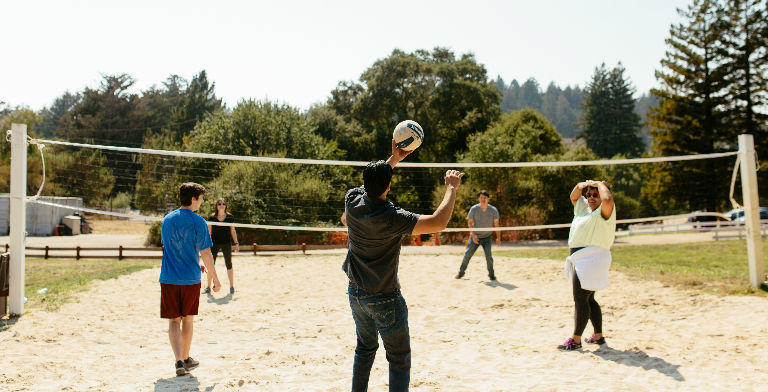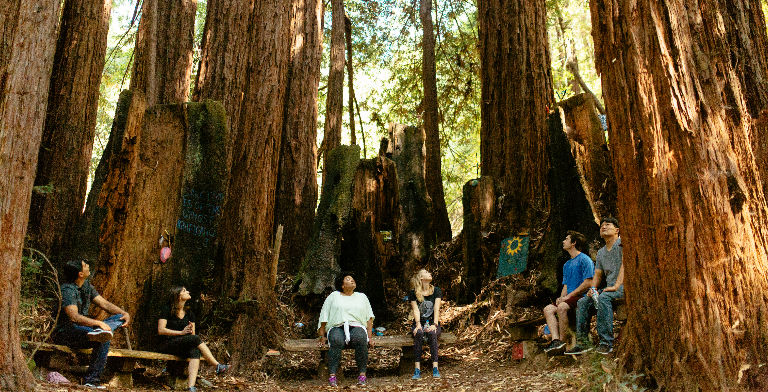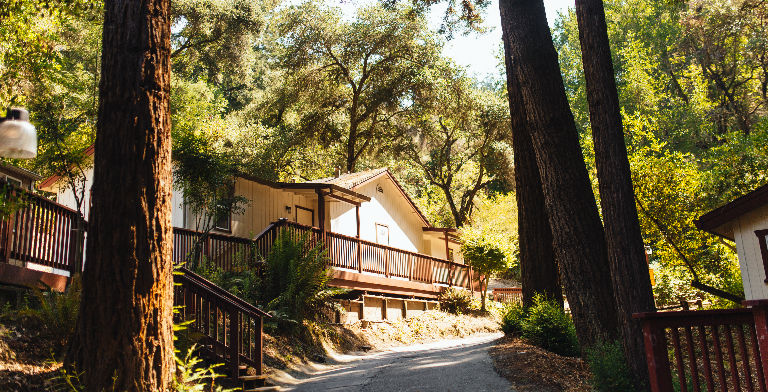The Camp Recovery Center helps adolescents & adults struggling with oxycodone addiction find long-term recovery. Located near Scotts Valley & San Jose, CA, The Camp provides premier oxycodone abuse rehabilitation.
Oxycodone Abuse Rehab
Oxycodone Abuse Rehab Near Santa Cruz & San Jose
Oxycodone is an opioid substance that is found in many different prescription pain medications, including both Percocet and OxyContin. This medication is used in the treatment of moderate to severe physical pain that comes from injury, surgery, a chronic pain condition, or pain that accompanies a specific medical illness. When used as prescribed and under the watch of a physician, oxycodone can provide much-needed relief for many individuals. However, since this substance brings on feelings of relaxation, euphoria, and sedation, it is intriguing to those who do not need it for a medical purpose. As this drug begins to become consumed regularly, tolerance can develop, making individuals consume more and more in order to obtain the desired effects. The result of this tolerance can be physical dependence, which can lead users to experience difficulty in stopping their behaviors. Thankfully, there are options for treatment that are specifically designed to help individuals make their oxycodone abuse a thing of the past.
At The Camp, we understand how challenging it can be to overcome an addiction oxycodone. In order to help individuals develop the skills needed to battle this addiction and continue healthy functioning, we have rehab programming that is able to help individuals make their first strides towards recovery and a life of sobriety.
Helping a Loved One
Helping a Loved One or Family Member Enter Oxycodone Abuse Rehab
When someone is struggles with an oxycodone addiction, it can be hard for his or her family to handle it. If you have a loved one or a family member who has displayed symptoms of an oxycodone addiction, you are likely grappling with a number of different emotions yourself. It is imperative to know that there are many different things you can be doing to help your loved one, although rehabilitation at a treatment center is the most important step. Some things you can do include the following:
- Spend time learning about oxycodone addiction as a disease. Doing so can help you understand why your loved one can’t just quit, and can also help you separate your anger from the actual disease. This can also be effective in helping you develop empathy for your loved one’s condition.
- Do what you can to learn about oxycodone as a drug, and find out what the signs, symptoms, and effects of its use are. Getting familiar with this information can help you prepare to speak with your loved one.
- Search around for different rehab centers that are effective in treating individuals who struggle with oxycodone addiction. This can help you to determine the level of care your loved one might need, as well as provide you with the insight you require to confront him or her.
- Talk with your loved one about your concerns. Approach him or her in a non-judgmental manner, and share your concerns regarding his or her condition. Provide him or her with the information that you have uncovered, and encourage him or her to obtain treatment at a rehab center as quickly as possible. Prepare for your loved one to be resistant, but continue to maintain your calm, and drive home the message that treatment is the best choice.
- If your loved one chooses to go to rehab, continue to be a strong source of support to him or her by being there every step of the way. Stay in touch with him or her and be willing to participate in any therapy sessions the center offers.
Why Consider Us?
Why Those Near Santa Cruz & San Jose Should Consider Oxycodone Abuse Treatment at The Camp Recovery Center
When treatment is not received, an oxycodone addiction can wreck one’s entire life. The physical pain that can come from the result of oxycodone abuse can include anything from dry mouth and constipation, to vital organ damage and visual disturbances. From a social standpoint, individuals usually withdraw themselves as they begin to focus solely on their oxycodone addiction. Relationships start to suffer, family issues can develop, and divorce can occur. Additionally, the effects that this substance can have on one’s cognition after it has been consumed can cause a dramatic decline in work performance, leading to job loss and financial strain. The longer that an addiction to oxycodone continues, the more vulnerable individuals become to struggling with self-harming behaviors and suicidal ideation. Thankfully, there is help available. These detriments can be defeated when comprehensive care from a rehabilitation center is received to help individuals end their addiction to oxycodone.
Types of Treatment
Types of Oxycodone Abuse Treatment Offered at The Camp Recovery Center
Nestled in the foothills of the majestic Santa Cruz Mountains, The Camp Recovery Center is a place of hope and healing where clinically sophisticated rehab is provided in a serene and secure environment.
For more than 30 years, The Camp has remained dedicated to providing the highest quality of life-changing rehab to adolescents and adults who have been struggling with an oxycodone addiction, as well as other forms of chemical dependency. Individuals who choose to receive treatment at our center have the opportunity to work with talented and experienced nurses, addiction counselors, family therapists, and other professionals whose clinical expertise is surpassed only by their commitment and compassion.
Rehab at The Camp is a highly personalized experience, with each resident following a plan that has been customized to ensure that we are providing the type and level of care that best meets his or her unique needs. The following are among the many elements that may be included in a resident’s rehab treatment plan at our center:
Detoxification: For individuals who have been unable to rid their bodies of oxycodone or other drugs prior to arriving at The Camp, oxycodone detoxification can be an essential precursor to full participation in treatment. When a resident is determined to be in need of detox services, we will coordinate with an offsite doctor, typically located near the Santa Cruz & San Jose areas, who will develop and approve an appropriate detox protocol. As is the case with all aspects of rehab at The Camp, detox protocols are developed and implemented in the manner that best meets the specific needs of each resident.
Medication management: Residents whose oxycodone addiction is accompanied by a co-occurring mental health condition may receive a referral to meet with a psychiatrist to determine if prescribed medication should be incorporated into their treatment plans. Residents who receive medications will meet with the psychiatrist on a weekly basis to monitor their progress and adjust their prescriptions if necessary. Members of our nursing staff also assist in monitoring residents’ medications.
Individual therapy: Residents and their case managers meet two times each week for individual therapy sessions. These sessions allow residents to process their experiences, discuss their rehabilitation progress, and address any concerns that have arisen since the previous session.
Group therapy: Group therapy is an essential part of treatment for oxycodone addiction at The Camp. A variety of groups are scheduled every day, including weekends. Process groups are conducted five days a week. The following are examples of specific groups that may be conducted during a resident’s time at The Camp:
- Activity Group
- Age Groups
- CBT Groups
- Detox Groups
- Experiential Group
- Focus Groups
- Music / Poetry Groups
- Men’s Group
- Women’s Group
The following are a few examples of the many topics that may be addressed in group therapy sessions at The Camp:
- Self-helping thinking
- 12-Step Recovery
- SMART Recovery
- Relapse prevention
Family therapy: Residents receiving treatment for oxycodone addiction have the opportunity to participate in family therapy sessions twice each month. These sessions, which are led by marriage and family therapists, are designed to facilitate healthy communication among family members, address negative feelings and emotions that are brought on by oxycodone addiction, and promote the healing and strengthening of the family unit. Located at our treatment center, near the Santa Cruz & San Jose areas, family therapy is convenient for those who receive this type of treatment.
Experiential therapy: A variety of experiential therapies are scheduled every week at The Camp. Residents also have the opportunity to spend time in our gym six days a week. Additional experiential therapies at our rehab center include the following:
- Acupuncture
- Meditation
- Yoga
Community meetings: Resident-run community meetings are held every morning, including both weekdays and on the weekends. These meetings, which are a major component of the rehabilitation process at The Camp, provide an opportunity for residents to review the agenda for the day, do readings, and address any issues that are relevant to the group. In addition to being sources of important information, community groups promote healthy independence and interdependence, while also facilitating the forming of productive, sober relationships that can be essential to supporting long-term recovery from oxycodone addiction.
At The Camp Recovery Center, we know that residential rehab is just one step on the path of lifelong recovery from a substance use disorder involving oxycodone addiction. To ensure that every adult and adolescent who completes treatment with us is best prepared for the next phase of his or her recovery, our case managers work closely with all residents to ensure that sources of continuing care and support have been identified, and all necessary arrangements for accessing this care have been made prior to discharge.
For adult residents who need a more structured level of care during their transition from residential treatment, we also offer intensive outpatient programming (IOP). Our intensive outpatient programming is convenient to Santa Cruz & San Jose, CA.
In the same manner that we provide a highly personalized rehab experience during a resident’s time at our treatment center, we are similarly dedicated to ensuring that, as they prepare to leave our campus, all residents have a continuing care plan that addresses the specific issues that are essential to their long-term recovery from oxycodone addiction.
To learn more about how The Camp Recovery Center is prepared to help you or a loved one overcome a problem with oxycodone, or for answers to any questions that you may have about any aspect of our programming, please do not hesitate to contact us at your convenience. We look forward to speaking with you, and helping you determine if The Camp is the perfect place for you or your loved one.
















